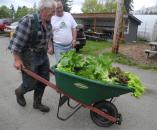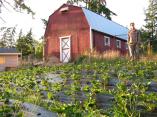Gwynne Dyer’s on a speaking tour of Canada and we were fortunate enough to join a packed house at the McPherson Playhouse to catch his Climate Wars talk last Thursday. He was of course selling his book – and provided a great capsule view of what it covers – but also offering some lessons learned while writing it. I’d heard the gist of the science he described at BCSEA meetings, but it was sobering stuff nonetheless.
My thumbnail version of significant points is:
- Climate change is moving faster than predicted because the predictions widely quoted by media are from the 2007 IPCC Intergovernmental Panel report. Which, if you track it back would have been based on 2003 data at the latest (tracking back to allow a year for meetings and editing; perhaps a cut-off of 2005 published papers which would have been using data gathered from 2003 or earlier), which doesn’t include the rapid advancements in newly industrializing nations like India and China.
- The speed of the climate changes are alarming the scientists who study them.
- Climate change reaches an irreversable point at 2 degrees increase in world temperatures; beyond this, natural climate feedback mechanisms kick in and there is nothing we can do to slow the damage.
- We are living on borrowed grain. The world is consuming more than it produces for the first time in its history; the reason we have not yet reached the crisis point is because we are dipping into global grain reserves. The figure he quoted, that reserves are sufficient to feed the world for 57 days, was actually published in 2006 – before the full effects of the Australian drought were felt – so it would be good to know what the current figure is (but in 2006, 57 days was cited as the lowest since the 56 day point reached in 1972.)
- The world loses 10% of its food production capability for every 1 degree increase in global temperature: it’s estimated that a 2 degree rise would reduce India’s food production capacity by 25%; China is expected to lose 38%. Dwyer noted that the World Bank has gathered information on the effects of temperature change on world food production but does not want to release it for fear of causing panic. But, he said, the governments are well aware of it.
- But what the governments can do to safeguard their citizens’ food security – without which there cannot be civil rule – is fraught with problems. You cannot make food grow without suitable climate or adequate water, and both are at risk. One of the cornerstones of world agriculture as we’ve practiced it is the wanton and excessive use of irrigation to grow crops: we’ve depleted our reserves and are busy tapping fossil water, which will not be replenished in our – or our great-grandchildren’s – lifetime. So water shortages loom, and conflicts between upstream and downstream states are a possibility.
- Governments who have some economic and environmental buffers against imminent disaster in the face of climate change also face complex problems in securing their own borders against climate refugees. Taking Mexico/USA as one example, Dyer pointed out that any border can be secured if you really want to do it, but the Americans do not have the political will to secure the Mexican border: without the illegal immigrants who fuel the agricultural and service economies, the country would cease to function, so it is in the interests of the US to keep the border porous. And in the case of the Americans, you can’t secure a border when 25% of your population originates in or is related to the population of the countries you are trying to keep out. And that’s a reality everywhere today, thanks to globalization and the dependence of all wealthy nations on black market or sweatshop labour to keep costs (pesky matters like salary levels and working conditions) down so that the rich can keep getting richer.
- One thing those rich folk won’t want to do is pay to clean up their mess, however. Dyer explained why a deal was not possible at Copenhagen, using the example of our own government. He asked us to imagine Stephen Harper returning to Ottawa to announce that Canadians would face an immediate 40% reduction in carbon emissions as well as a multi-billion dollar support package to the likes of India and China to help them prepare for a carbon-neutral future. The fact is that wealthy nations are wealthy because we built our wealth on cheap oil, which has fuelled both our standard of living and the environmental disaster we are collectively facing. The only way forward is that we have to pick up the tab for this, and no government on earth is going to get re-elected once it’s done so.
- Dyer predicts we will not make the 350ppm target for emissions.
- He does believe that the world will eventually act, belatedly, because it will have to for all the reasons above and then some. And the one tool we have available is geoengineering climate change, to temporarily reduce the increase in average global temperatures while the necessary changes to the way we live are implemented. A couple of examples are to either seed the stratosphere with sulphur dioxide, mimicking the effects of volcanic eruptions; or seeding stratocumulus clouds above the ocean with salt water, to enhance their cooling effect.
- Geoengineering, he stressed, is not a cure, but it is likely to be all we have in our emergency kit down the line when it’s too late for positive political action. And at the point drastic measures are taken, it will quite possibly be too late to save the earth’s oceans. (And it will certainly be too late to feed the entire global population, since crops take time to grow and harvest, although he did not go there specifically.)
- The question of who funds this kind of research, and who gets to make the decision to use it – since it will affect every living thing on the planet – is the subject of a conference he was travelling to next.
- He also stressed that the world is about as peaceful as it’s ever been and is ever able to get, so the social conditions are right to implement drastic action to save our world. Once the climate changes kick in, governments will be distracted by their own emergencies. So it’s now or never.
- The “what do we do” question received the usual answer: demand political action at every level; impress upon your representatives the urgency of the situation and be ready to embrace the somewhat drastic changes that will need to be made if the world is to survive to be handed on to future generations.
If you haven’t heard him talk on this subject, here’s a podcast version from TVO which is similar to the talk I attended. Worth watching.









